2019 China Tax Law Forum and the 8th China Tax Lawyers and Tax Agents Forum
On December 15, 2019, the "2019 China Tax Law Forum and the 8th China Tax Lawyers and Tax Agents Forum" was held at the Beijing Friendship Hotel, jointly sponsored by the All China Lawyers Association and the China Certified Tax Agents Association, and jointly organized by the Finance and Taxation Law Committee of the All China Lawyers Association, the Finance and Taxation Law Research Center of China University of Political Science and Law, Beijing Hwuason Law Firm, Huashui Tax Agent Firm Co., Ltd., King & Wood Mallesons and China Tax Agent Co., Ltd. With the theme of "Promoting the Modernization of National Governance System and Governance Capacity and New Opportunities for Tax-related Services", the forum received more than 900 representatives from law firms, tax agent firms, accounting firms, tax authorities, enterprises, universities and other walks of life from all over the country. In addition, the whole forum was broadcast live by Huashui University, and a total of about 24,000 people watched the live broadcast online.
At 9 a.m. on December 15, the opening ceremony of the forum was grandly held. At the opening ceremony, Han Xiutao, Secretary-General of the All China Lawyers Association, Zhang Shuxue, Vice President and Secretary-General of the China Certified Tax Agents Association, Liu Jianwen, President of the Finance and Taxation Law Research Association of the China Law Society and Professor of Peking University, and Shi Zhengwen, Director of the Finance and Taxation Law Research Center of China University of Political Science and Law, attended the opening ceremony and delivered speeches successively. Gao Peiyong, Vice President of the Chinese Academy of Social Sciences and member of the Faculty of Social Sciences, delivered a keynote speech on "Tax Reform in the Process of National Governance Modernization". Liu Tianyong, director of the Finance and Taxation Law Committee of the All-China Lawyers Association and director of Hwuason Law Firm, presided over the opening ceremony.

The picture shows the speech of Secretary General Han Xiutao
In his speech, Secretary-General Han Xiutao emphasized that this year marks the 70th anniversary of the founding of the People's Republic of China and the 40th anniversary of the restoration and reconstruction of the lawyer system. He pointed out that there are four important factors for the successful convening of this China Tax Law Forum: first, our country is unswervingly promoting the rule of law in taxation and building a tax legal system with Chinese characteristics, because of the importance attached to the rule of law, tax agents and tax lawyers have room to play; second, our country is vigorously promoting the deepening of the tax reform, providing institutional space for tax lawyers; third, the implementation of large-scale tax reduction and fee reduction and other tax policies has brought about an unprecedentedly active tax law service market; fourth, tax lawyers are in line with the development direction and comprehensiveness of the specialization and refinement of the lawyer industryThe legal profession not only needs general practitioner lawyers, but also specialized doctor lawyers such as tax lawyers. At the same time, he put forward four suggestions to the majority of young tax lawyers, one is that tax lawyers should make great achievements in building a socialist tax legal system with Chinese characteristics, the second is to make greater contributions to the standardization, institutionalization and rule of law of tax collection and management, the third is to make greater achievements in the healthy development of the service economy, and the fourth is to make greater contributions to the protection of the legitimate rights and interests of taxpayers and social fairness and justice.

Pictured is the speech of Secretary General Zhang Shuxue
In his speech, Secretary-General Zhang Shuxue proposed that as an important professional force of tax-related services and a new social class, tax accountants should consciously integrate into and serve the national strategy around the development of the service market economy and the modernization of the national governance system and governance capacity, and at the same time achieve their own rapid development, they should more actively support and serve the reform and development of taxation, and play a greater role in optimizing tax payment services, improving the efficiency of tax collection and management, and implementing tax reduction and fee reduction. In this regard, he put forward three suggestions for the development of the tax agent industry: first, to achieve the high-quality development of the tax agent industry, tax agents should fully carry forward the spirit of hard work, and constantly enhance the ability of self-challenge and self-improvement; second, innovate tax-related professional services, not only to support the tax authorities to implement the national tax laws and regulations, but also to safeguard the legitimate rights and interests of taxpayers; third, to strengthen cooperation and exchanges between industries, tax agents, lawyers, Accountants are important tax-related professional service forces, each of them plays an irreplaceable and important role, only by strengthening exchanges, in order to achieve business cooperation and common development.
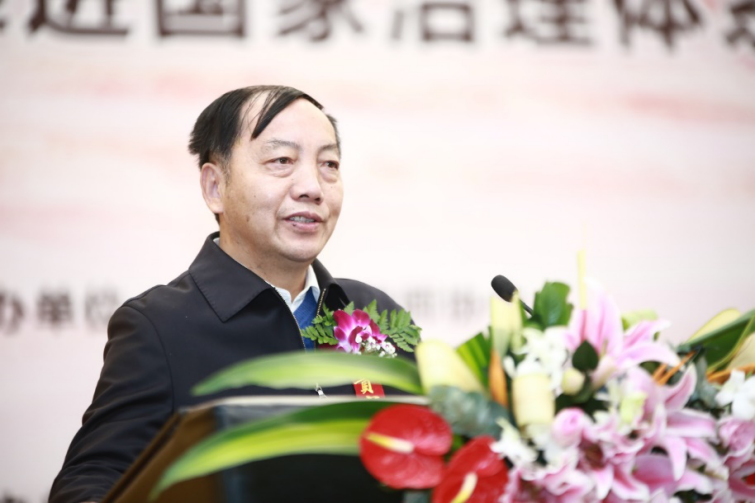
Pictured is President Liu Jianwen's speech
In his speech, President Liu Jianwen said that at present, the tax legislation work has entered the fast lane, and he proposed that it is very rare to introduce more than a dozen laws in one legislative field in such a short period of time. He pointed out that due to the conflicts between the individual tax laws and between the separate tax laws and other laws, as well as the simple provisions of the single tax laws cannot meet the practical needs, it is urgent to solve them by formulating the General Provisions of the Tax Law. He appealed to the Legislative Affairs Committee of the National People's Congress to incorporate the "General Provisions of the Tax Law" into the legislative plan of the next session and establish a scientific and rational tax law system. He stressed that in the field of tax law, the importance of the general provisions of the tax law is self-evident, the civil law emphasizes expansion, the criminal law emphasizes modesty, and the tax law emphasizes both expansion and modesty. The maturity of the theoretical research of fiscal and taxation law, the experience of the drafting process of the Basic Law on Taxation in the past 20 years, and the legislative mission of optimizing the tax system have made the time ripe for the formulation of the General Provisions of the Tax Law.
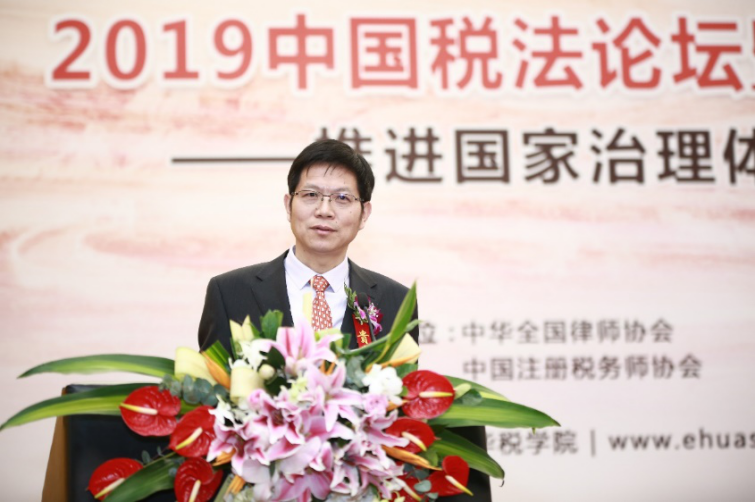
The picture shows Prof. Shi Zhengwen's speech
In his speech, Professor Shi Zhengwen pointed out that tax lawyers and tax accountants are facing an unprecedented era of fiscal and taxation legislation, and in less than a month, they have successively released the draft of the announcement of the final settlement of value-added tax, consumption tax and individual income tax, and the draft of the customs law is also expected to be released within the year. The acceleration of tax legislation will greatly expand the tax-related service market. At the same time, tax lawyers and tax agents should pay attention to the fact that the law enforcement capabilities of tax authorities will gradually improve with the emphasis on the training of tax cadres, and the strengthening of the law enforcement level and collection and management capabilities of tax cadres will make the upgrading and transformation of tax agents' practice ability and business face unprecedented challenges, and tax lawyers and tax agents must accelerate their transformation into expert tax representatives. He pointed out that case study is the best way to learn from theory and practice, and the two associations jointly carried out the collection and selection of excellent tax law case papers for the first time on the occasion of this forum, which is conducive to encouraging and guiding tax agents and tax lawyers to invest in case studies, analyze cases in depth, and summarize experience. The selection of the top ten case papers is a positive and beneficial exploration to promote the development of the overall industry and prosper the development of tax law theory and practice.
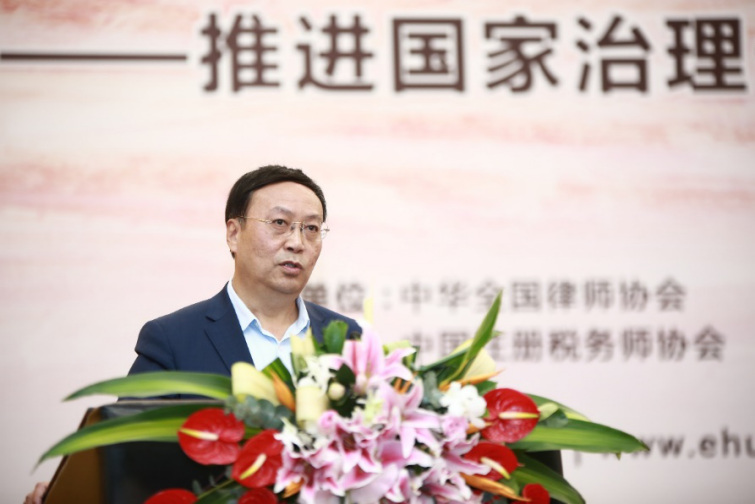
Photo shows Vice President Gao Peiyong delivering his keynote speech
Vice President Gao Peiyong delivered a keynote speech on the theme of "Tax Reform in the Process of National Governance Modernization", and he combined the two backgrounds of the Fourth Plenary Session of the 19th Central Committee and the Central Economic Work Conference, pointing out that tax regulation and control is not only an important starting point for economic work in 2020, but also an important dimension for the modernization of national governance and the improvement of the socialist tax system. In view of the strategic deployment made by the Central Economic Work Conference to run the main line of supply-side structural reform through the whole process of macroeconomic regulation and control, he pointed out that tax regulation and control should also be changed, from the past to the demand-side reverse hedging adjustment to the supply-side long-term structural reform. In this regard, he took tax reduction and fee reduction as an example, pointing out that compared with the past, the change of tax regulation and control from indiscriminate subject tax reduction to tax reduction for enterprises, from income tax reduction to value-added tax reduction, and from short-term tax reduction of policy adjustment to permanent tax reduction of system reform are all manifestations of China's transformation from stimulating and managing the demand side to supply-side reform as the main line.

Liu Guiming, editor-in-chief, presided over the award ceremony of "Top Ten Tax Law Case Papers"
After the speeches of the guests at the opening ceremony, the "2019 National Top Ten Excellent Tax Law Case Papers" and the nomination award ceremony were held. Liu Guiming, editor-in-chief of the journal "Democracy and Legal System", presided over the award ceremony, introduced the selection of tax law case papers, read out the list of top ten papers and nominated award-winning authors, and interviewed some of the award-winning authors. Han Xiutao, Secretary-General of the All China Lawyers Association, and Zhang Shuxue, Vice President and Secretary-General of the China Certified Tax Agents Association, presented honorary certificates to the award-winning authors. The selection of "2019 National Top Ten Excellent Tax Law Case Papers" aims to give full play to the important role of typical tax law cases in guiding case handling, improving tax legislation and developing tax law theory.
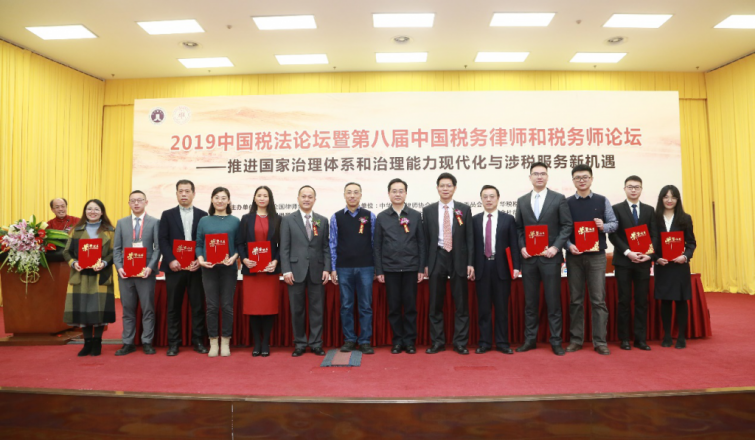
Pictured are the award-winning authors of the "2019 National Top Ten Outstanding Tax Law Case Papers" with the awarding guests
This year's forum includes five themes, namely: (1) Modernization of National Governance and Tax Reform and Tax Legislation, (2) Reform of Tax Collection and Management System and Innovation of Tax-related Services, (3) In-depth Analysis of Recent Tax Dispute Cases and Business Improvement, (4) Innovation of Tax-related Services in the New Era, and (5) Innovation of the Belt and Road Initiative, Digital Economy and International Tax Services.
The first part of the theme is "National Governance Modernization, Tax Reform and Tax Legislation", which was co-chaired by Jia Shaohua, Vice President of the Fiscal and Taxation Law Research Association of the China Law Society and Director of the Institute of Tax Education of the Central University of Finance and Economics, and Tong Pengfang, Deputy Director and Secretary-General of the Finance and Taxation Law Committee of the All-China Lawyers Association and Director of Beijing Derun Law Firm. Professor Yang Xiaoqiang of Sun Yat-sen University Law School, Professor Zhu Weiqun of School of Public Economics and Management of Shanghai University of Finance and Economics, and Shi Zhengwen, Director of the Research Center of Finance and Taxation Law of China University of Political Science and Law, delivered keynote speeches successively.
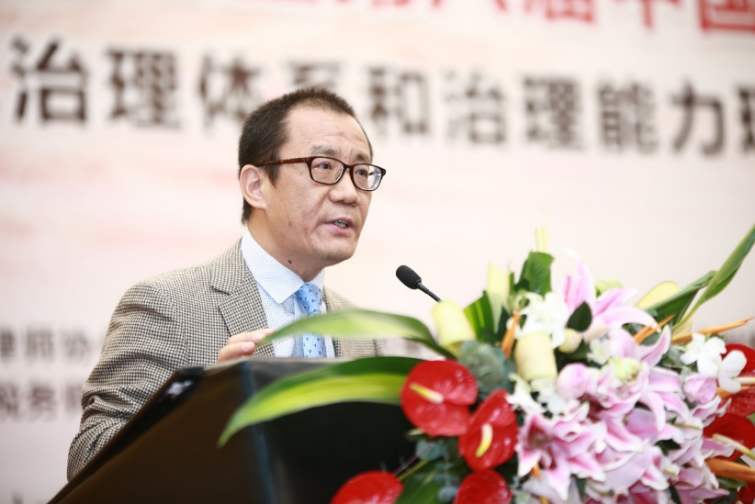
The picture shows Prof. Yang Xiaoqiang's speech
Professor Yang Xiaoqiang gave an in-depth analysis of the theoretical framework of the VAT Law (Draft for Comments) with the title of "Interpretation of the VAT Law (Draft for Comments)". First of all, he pointed out that the overall objectives of China's VAT law legislation should include three items: first, China's VAT code should neither become a pure collection of legal concepts, nor can it become a VAT manual or operation manual; second, the VAT code should be directional, methodical, comprehensive, and open, and leave room for exploratory legislation in the future; and third, the VAT code should ensure the stability of the legal framework, that is, it should build a complete legal system structure. Subsequently, he combined with the policy objectives of the EU VAT directive to interpret the relationship between tax laws, policies and administrative management, and he believed that Article 1 of China's VAT legislation should clarify the purpose clause or task clause of the legislation, and the current VAT Law (Draft for Comments) just lacks the purpose clause, resulting in unclear legislative positioning. Next, Professor Yang Xiaoqiang explained the main issues of VAT legislation, including the basic principles that should be reflected in the legislation, the legal requirements of VAT taxable transactions, tax rates, the clarification of the concepts of VAT and capital gains tax, and the inter-legal coordination of VAT.

Prof. Zhu Weiqun's speech
Professor Zhu Weiqun's speech was entitled "Interpretation of the Consumption Tax Law (Draft for Comments)", in which he mainly compared the draft for comments with the current Interim Regulations on Consumption Tax, and compared and analyzed the seven changed clauses of "taxpayers, collection links, sales amounts, verification and collection, time of occurrence of tax obligations, place of tax payment, and tax payment period", and proposed to add three new articles in the draft for comments, including "statutory authorization of taxation, deduction of tax paid, information sharing and coordination working mechanism". He believes that the provisions of the "Consumption Tax Law" (Draft for Comments) have been expanded (from 17 articles to more than 20 articles) and the quality of the text has been improved (the wording is more precise, and the inaccurate, contradictory and conflicting words in the original interim regulations have been deleted), but he also believes that the draft for comments needs to be improved in the following three aspects: first, it does not clarify the legislative purpose, and the legislative positioning and function of consumption tax are unclear, and second, it does not clarify the legislative principles, that is, what kind of spirit is formulated according to what kind of spirit, and the consumption tax items are expanded. Concerns about the tendency to extend the value-added tax (VAT) have been raised, and the third is that the "new statutory tax authorization clause" has reserved space for consumption tax reform, and has also made the "tax statutory" principle not implemented. He believes that authorization is possible, but it must be limited in time, conditions and scope in order to comply with the principle of taxation law.
Professor Shi Zhengwen's speech was entitled "Discussion on the Basic Issues of Customs Law Legislation", in which he deeply discussed the necessity and feasibility of customs law legislation through the analysis of the current tariff legislation, and proposed that the goal of tariff legislation is to establish a modern tariff system, and tariff legislation should implement the legal principles of taxation, realize the codification of the tariff system, and take into account the fairness of the tax law and pay attention to the efficiency of tax collection and management. He believes that the customs law should be positioned as a "comprehensive tariff code", with comprehensive and systematic provisions for tariff collection activities. Finally, he proposed that tariff legislation should pay attention to the formulation, adjustment and division of the right to interpret tariffs and tax rates, unify the tax system for goods and articles, and clearly enumerate and appropriately expand the scope of statutory tax reductions and exemptions.
After the keynote speech, Chen Shaoying, vice president of the Finance and Taxation Law Research Association of the China Law Society and professor of the School of Economic Law of East China University of Political Science and Law, and Liu Yi, director of the Department of Finance of the School of Economics of Peking University, made wonderful comments on the content of the speeches.
The second session, entitled "Tax Administration Reform and Tax-related Service Innovation", was co-chaired by Chen Shuangzhuan, Deputy Director of the Editorial Department of Tax Research, and Zhang Suqiang, Partner of King & Wood Mallesons. Li Linjun, vice president of the China Certified Tax Agents Association, Cheng Ping, distinguished lecturer of the Tax Cadre Training College of the State Administration of Taxation, and Wang Tingting, associate professor of the School of Economic Law of Southwest University of Political Science and Law, delivered keynote speeches respectively.

The picture shows Vice President Li Linjun's speech
Vice President Li Linjun's speech theme is "tax collection and management reform and tax-related service innovation", he first focused on "tax collection and management reform", talked about the "three-in-one tax collection and management reform model" in 94 years, to the 30-word tax collection and management reform policy in 97 years, from the revision of the tax collection and management law, in accordance with the new collection and management law to establish the collection and management procedures, to the full implementation of the third phase of the golden tax, as well as the fifth round of reform, the merger of national and local taxes, the merger of social security taxes, and the division of national and local tax collection responsibilities. He pointed out that after the third phase of the golden tax was launched, it brought accurate crackdowns on some tax evasion and false issuance, and improved the efficiency of tax collection and management. He compared the current tax collection and management law with the draft of the tax collection and management law issued in 2015, focusing on clarifying the two changes that have occurred, one is the integration of three certificates, the second chapter of tax registration may be changed to the identification of taxpayers, the third to seventh chapters have been added, and the significance of abolishing the pre-payment of tax has been highlighted. Finally, focusing on "tax-related service innovation", he proposed that the tax-related services that tax agents can provide include eight major items and 107 sub-items, and some tax offices have established a full-process service platform for tax-related service business. It is also proposed that the State Administration of Taxation has published a draft for comments on the final settlement and payment of individual income tax, and there is a lot of room for tax-related professional service institutions to act as agents.
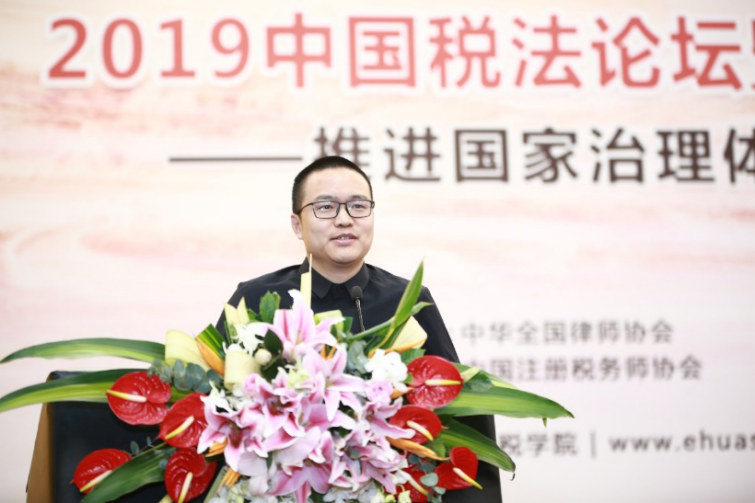
The picture shows Cheng Ping's speech
Dr. Cheng Ping's speech was titled "Hot and Difficult Issues of New Individual Income Tax Remittance and Innovation of Tax-Related Services", in which he firstly analyzed the hot and difficult issues of individual income tax remittance in 2020, and explained the concepts of comprehensive and categorical tax system, comprehensive income of individual residents, and business income in depth. He suggested that the total number of individual income tax remittance would be as high as 80 million, and the tax authorities would face greater pressure, and suggested that for high-income and high-net-worth people, 2020 might only be called the "quasi-YuanYi" for the provision of tax-related services, and that "YuanYi" would be the "first year" for the provision of tax-related services. The "first year" will come only with the full launch of CRS and the large-scale abolition of authorized levies. In his speech, he proposed that the approved levy, in general, should be "standardized checking, not standardized approval", that is, the approval itself should be punitive in nature, punitive approval, but in contrast to the current personal tax levy, the approval has become a kind of preference. Finally, he proposed that tax-related service organizations should, on the basis of skilled business and high-quality services, innovate their service delivery through cross-border cooperation to seize the major opportunity of individual tax remittance.
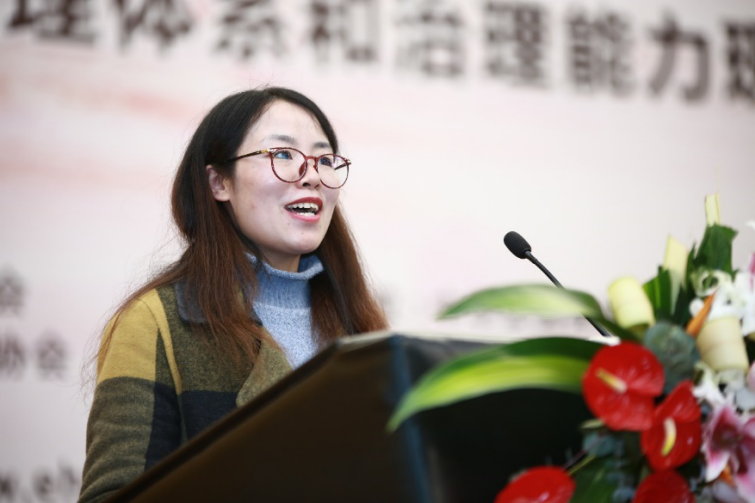
Pictured is Associate Professor Tingting Wang's speech
Associate Professor Tingting Wang's speech was entitled "Understanding and Application of Article 51 of the Tax Administration Law from the Case of Shen Heng's Application for Tax Refund", in which she highly affirmed the adjudication value of the case. By returning to the essence of tax law and the basic theory of constituent elements of tax law, the tax refund case clarified the essence of the taxpayer's right to request tax refund, which to a certain extent broke through the thinking of "treasuryism" and "state-oriented", and provided a model for the protection of taxpayers' rights. The case returned to the principle of taxation and the purpose of tax law. The case returned to the principle of taxation and the purpose of tax law, and made a double judgment of "law and reason" on how to maximize the protection of the legitimate rights and interests of administrative counterparts. She argued that the realization of the right to claim tax refund should be conditioned on the improvement of taxpayers' awareness and the enhancement of tax enforcement capacity. At the same time, she also put forward a path to improve the system of the right to claim tax refund, such as the differentiation of the starting point, the convergence of the limitation period for tax refund, the rationalization of the attribution system, and the clarification of the legal responsibility.
After the keynote speeches, Liu Ying, deputy director of Taxation Research Institute of Capital University of Economics and Business, and Cai Chang, director of Tax Planning and Legal Research Center of Central University of Finance and Economics, made wonderful comments.
The third part of the session, titled "In-depth Analysis of Recent Tax Dispute Cases and Business Enhancement", was co-chaired by Prof. Li Meiyun of the School of Civil, Commercial and Economic Law, China University of Political Science and Law, and Mr. Zheng Yanchen, Vice President of Beijing Registered Taxation Technicians Association and Chairman of China Tax Net Taxation Firm. Mr. Liu Tianyong, Director of Finance and Taxation Law Committee of All China Lawyers Association, Mr. Zhao Tingting, Partner of Beijing Junhe Law Firm, and Mr. Liang Fushan, Teacher of the Party School of the State Administration of Taxation of the Communist Party of China (SATC), delivered the keynote speeches.
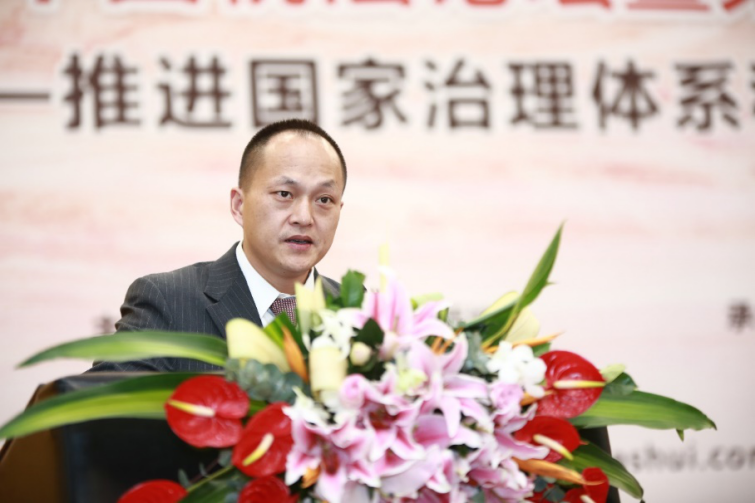
Pictured is Director Liu Tianyong's speech
Mr. Liu Tianyong's speech was titled "Prevention, Control and Response to Tax-related Criminal Risks of Entrepreneurs", and he firstly introduced the two-year special action of the four ministries and commissions, the "Hundred Cities Battle" of public security organs to combat tax-related crimes, and the joint efforts of tax and police to combat and rectify tax-related crimes. He firstly introduced the two-year special action of the four ministries and commissions, the "Hundred Cities Battle" of the public security authorities against tax-related crimes, the joint efforts of the tax authorities and the police in combating and remedying tax-related crimes, and pointed out that at present, the tax-related crimes are at a high level of incidence, with a high number of such crimes in East China, and more prominent cases of major crimes in Xinjiang. At the same time, he also sorted out the important assertions and measures made by the Central Government, the Supreme Court and the Supreme Prosecutor's Office on the protection of private entrepreneurs, and reminded entrepreneurs to pay attention to the tax-related criminal risks by comparing the two aspects of "protection" and "crackdown. Entrepreneurs pay attention to tax-related criminal risks. Subsequently, Mr. Liu Tianyong pointed out that the internal reason for entrepreneurs' tax-related criminal risk lies in the fact that enterprises attach importance to short-term economic benefits, neglect business compliance, and have weak legal concepts and insufficient awareness of tax-related criminal risk; while the external reasons include the lagging tax reform, imperfect market economic system, and the crude provisions of Article 205 of the Criminal Law and other aspects. He believes that tax-related criminal risk has five characteristics such as susceptibility, industry, complexity, high risk, and implicativeness, which are specifically manifested in five aspects such as entrepreneurs' personal off-the-case property being improperly seized, detained, frozen, confiscated as illegal proceeds, detained for an extended period of time or improperly, and implicating family members, varying caliber of law enforcement in different places, and inconsistency of criminal judgments. Finally, Mr. Liu Tianyong proposed three strategies for entrepreneurs' tax-related criminal risk prevention and control from the aspects of raising awareness, actively defending and improving legislation.
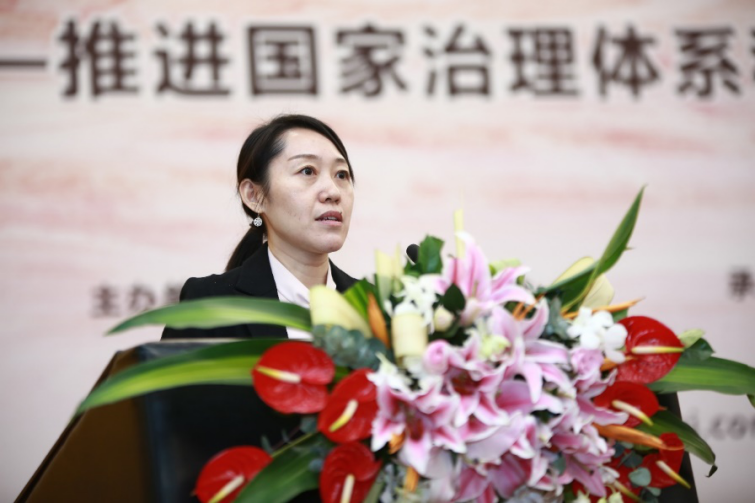
Ms. Zhao Tingting's speech
Zhao Tingting's speech was titled "The Impact of China's Personal Tax Anti-Avoidance Provisions on Commercial Arrangements from an Overseas Equity Transfer Case", analyzing the impact of the personal tax anti-avoidance provisions on the delivery of equity through the explanation of an overseas equity transfer case, and analyzing in detail the tax considerations of the buyer and the seller of the equity (tax, tax payment, withholding responsibility). Finally, she proposed that tax lawyers can play an important role in the drafting of transfer agreements, review of relevant tax documents, possible tax-related and commercial dispute resolution after the delivery of equity.

Dr. Fushan Liang's speech
Dr. Liang Fushan's speech was titled "Review of the Case of Individual Restricted Shares under Individual Tax Reform". He firstly clarified the research background of the speech topic, and the data that in FY2019, compared with FY2018, the reduction of individual shareholders' restricted shareholdings has increased significantly, and the proportion of listed companies' actual controllers who are natural person shareholders has reached 46.9%. Individual restricted shares are getting more and more attention as an important type of shares in China's stock market. He introduces a case of transfer of individual restricted shares and comments on it from the perspectives of policy background, jurisprudential perspective and personal tax reform. Finally, he proposed that tax policies related to individual restricted shares should be correctly understood and applied, and risks should be prevented while preferential policies should be enjoyed to the fullest extent, and more attention should be paid to the tax risks of the transfer of listed companies' restricted shares after the personal tax reform.
After the keynote speech, Zhou Xuzhong, professor of Law School of Capital University of Economics and Business, and Wang Zhaohui, partner of Beijing Jincheng & Tongda Law Firm, made wonderful comments on the content of the speeches.
The fourth part of the program, titled "Innovation of Tax-Related Services in the New Era", was co-chaired by Wang Jin, vice president of Beijing Registered Taxation Technicians Association, and Sun Ping, vice president of Sichuan Registered Taxation Technicians Association. Mr. Duan Tao, Partner of King & Wood Mallesons, Mr. Ge Qanda, Tax Partner of KPMG, Mr. Li Wenjing, Partner of China Tax Net Taxation Firm, Mr. Ge Hailin, Member of the Guidelines Committee of China Taxation Association, and Mr. Wei Zhibiao, CEO of Huataxi Academy delivered keynote speeches respectively.

Picture shows Ms. Duan Tao's speech
Duan Tao's speech was titled "Upgrading Tax-related Services in M&A Transactions", in which she firstly put forward seven major tax considerations that tax lawyers should make in M&A restructuring business, including how to reduce tax costs and tax risks, how to create a flexible investment platform for capital increase or exit, how to optimize the investment structure and transaction methods, whether to retain the original financial and operational continuity of the company, how to design tax clauses in transaction documents, and how to solve the historical tax risks of the enterprise. She also further elaborated on the specific application of the above tax considerations through three practical cases, including how to identify the tax risks of the target enterprise, how to design the tax clauses in the transaction documents, and how to resolve the historical tax risks of the enterprise. She believes that tax lawyers should highlight the value of tax-related services through tax due diligence, tax burden measurement and comparison, transaction plan design, assisting enterprises in completing tax declarations, and intervening in possible tax disputes.

Mr. Ge Qianta's speech
Mr. Ge Qianda's speech is entitled "Analysis of Difficult Issues of Tax-Related Services in the Current Financial Industry". First of all, he introduces the overview of the financial industry and the characteristics of the industry, which has a large scale of enterprises, a large number of enterprises under the management of the Thousand Group, and a high degree of digitization in the industry. He firstly introduced the overview and characteristics of the financial industry, including the large scale of enterprises in the financial industry, the large number of enterprises under the management of Thousands of Groups, and the high degree of digitalization in the industry. Finally, he made an in-depth analysis of the difficult problems of tax-related services in the financial industry, such as the lagging tax policies and the differences in the operation of levies and administrations in different places.

Pictured is Li Wenjing's speech
Li Wenjing's speech was titled "Frontier of Family Wealth Management Tax Planning Practice". She firstly proposed that the complete family wealth management covers the life cycle of wealth creation, wealth preservation, wealth enhancement and wealth transmission, and it is the goal of family wealth management to maximize the formation of a benign cycle system throughout the life cycle of wealth by means of systematic arrangement and planning. She believes that the key point of family wealth management tax planning is to consider not only the real demand environment of wealth management tax planning, but also the tax risk consideration of global asset allocation. Finally, she analyzed the common tools of insurance, family trust, and departure structure in detail with the actual tax planning cases of family wealth management.
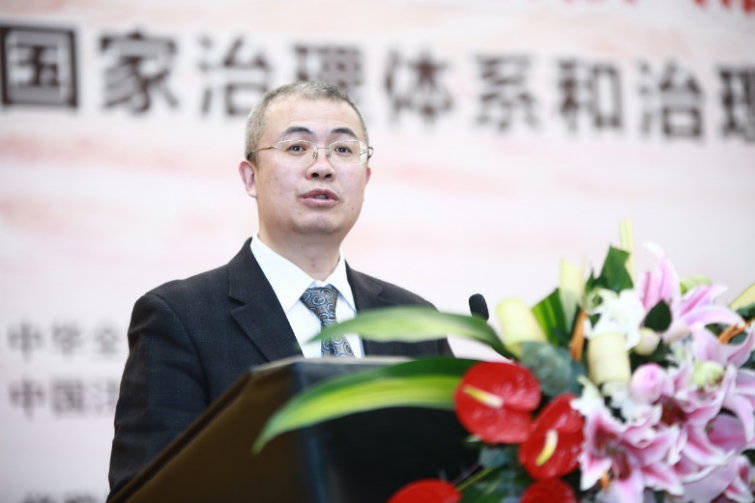
Ge Hailin's speech
Ge Hailin's speech was titled "Opportunities and Challenges of Tax Forensic Appraisal Business", and he pointed out that tax forensic appraisal is a branch of forensic appraisal, which is an important measure to ensure the smooth progress of tax-related litigation activities. He further analyzed that, with the reform of judicial appraisal supervision and the abolition of administrative access registration management for four types of external appraisals, such as forensic medicine, undocumented appraisal, audio and video data and environmental damage, the feasibility of tax judicial appraisal business is sufficient for tax firms registered by the administration and tax accountants who have obtained tax accountant's qualification to practice tax appraisal. He believes that the monitoring of VAT after the on-line of Golden Tax Phase III can be said to be full chain and no dead angle supervision, and the business market demand is huge. On this basis, tax accountants should meet the opportunities and challenges of tax forensic business by improving the quality of forensic business and expanding the forensic business market.

Picture shows Wei Zhibiao's speech
Wei Zhibiao, CEO of China Tax Academy, spoke on the topic of "Tax Law Reform and Tax-Related Training Innovation". He proposed that comprehensively deepening the reform of the fiscal and taxation system and actively implementing the principle of tax law have put forward higher requirements for every tax practitioner, and that in the era of mobile Internet, the reform of the tax law and the innovation of tax-related training should be equipped with the following concepts: Internet + Tax + Law. Thinking.
After the keynote speeches, Guo Yongping, Director of the Tax Enforcement Research Center of the Party School of the State Administration of Taxation, and Jifeng, Senior Manager of Deloitte Tax, made wonderful comments.
The fifth part, titled "'Belt and Road' Strategy, Digital Economy and International Tax Service Innovation", was hosted by Teng Xiangzhi, Director of the Case Study Center of Finance and Taxation Law of the Chinese Academy of Social Sciences. Cui Xiaojing, Professor of Wuhan University Law School, Jiang Yuesheng, Vice President of Jiangsu International Taxation Research Society, Ni Yongjun, Partner of Zhonglun Law Firm, and Li Hua, Senior Tax Director of Microsoft Greater China, delivered keynote speeches respectively.

Prof. Cui Xiaojing's speech
Prof. Cui Xiaojing's speech was titled "Research on Legal Issues of Cross-border Loan Interest Tax Coordination in the Context of Belt and Road", in which she compared the similarities and differences of the legal provisions on loan financing interest tax between China and developed countries in Europe and the United States through the explanations of two actual cases. She believes that the bilateral tax agreements signed between China and the Belt and Road countries should be improved in three aspects: using the positive list model as far as possible, appropriately expanding the coverage of tax-exempt financial institutions on the positive list, and cautiously selecting countries with the convergence of the amount of two-way flow of borrowed and lent funds. At the same time, we should focus on building a stable and effective dialogue platform and consultation mechanism among the Beltway countries, try to take the lead in organizing regular meetings between the heads of the Beltway countries and national tax authorities, and join hands with Russia and other countries with equal two-way investment to consult on the formulation of standards, and make an exhaustive list of certificates for financial institutions enjoying the interest exemption in the form of a multilateral memorandum of understanding, as well as set up a back-up clause and improve the relevant consultation procedures. Procedures.
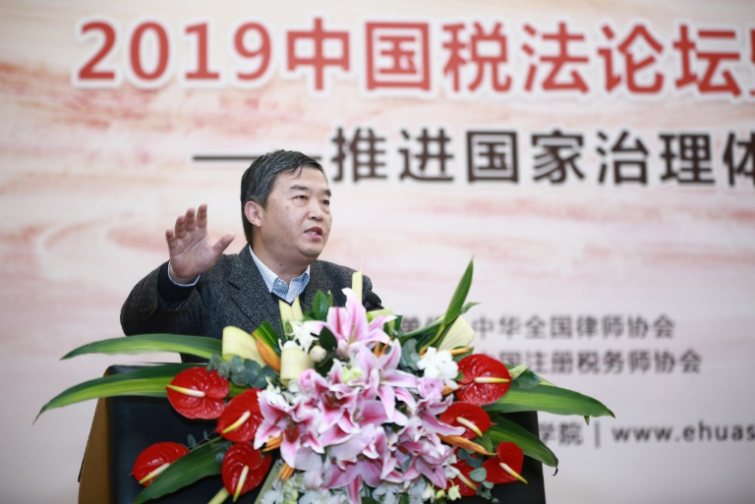
Mr. Jiang Yuesheng, Vice Chairman of the Board of Directors, made a speech
Vice President Jiang Yuesheng's speech was titled "Transformation, Challenges and Cases in China's Anti-Avoidance", in which he pointed out that China's anti-avoidance tax has undergone profound changes after BEPS, and that lawyers should be concerned about it and should have a role to play in it. He pointed out that at present, the major challenges facing China's anti-avoidance tax include the conflict of the independent transaction principle and the impact brought by the two pillars of the International Numerical Tax Program (INTP). Jiangsu Province was the first to develop the Profit Monitoring Level System for Multinational Corporations, an initiative to improve the business environment. He classified foreign enterprises into three categories, namely, "basic domestic sales, basic foreign sales, and both domestic and foreign sales", and put forward suggestions from the perspective of tax administration by tax authorities, with the ultimate goal of realizing the virtuous circle of promoting administration by investigation and the two-way promotion of anti-avoidance work and the business environment.
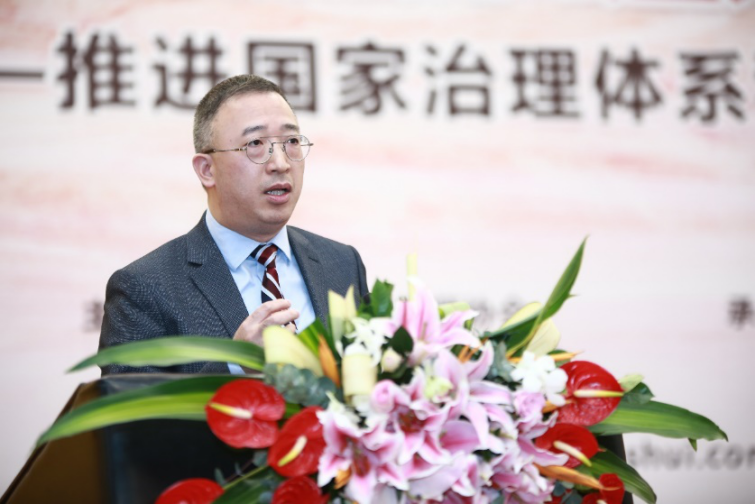
Picture shows Mr. Ni Yongjun's speech
Mr. Ni Yongjun's speech was titled "Innovation of Tax-related Services for Chinese Enterprises Going Global", and he suggested that cross-border tax services have more opportunities than domestic tax services, and there is still more service space for Chinese enterprises going global. Combining his experience in cross-border services, he firstly summarized the main ways for Chinese enterprises to "go out" as foreign contracted projects, foreign direct investment and foreign labor service cooperation, among which the second way has the largest service space. He believes that the provision of cross-border tax-related services requires tax services for the whole investment life cycle, including pre-investment, operation process and investment exit. Finally, he suggested that tax accountants and tax lawyers should do a good job in cross-border tax consultancy in terms of being able to work bilingually, grasping the overall plan and arrangement of tax services for enterprises going abroad, and improving the tax law reserve related to cross-border business.
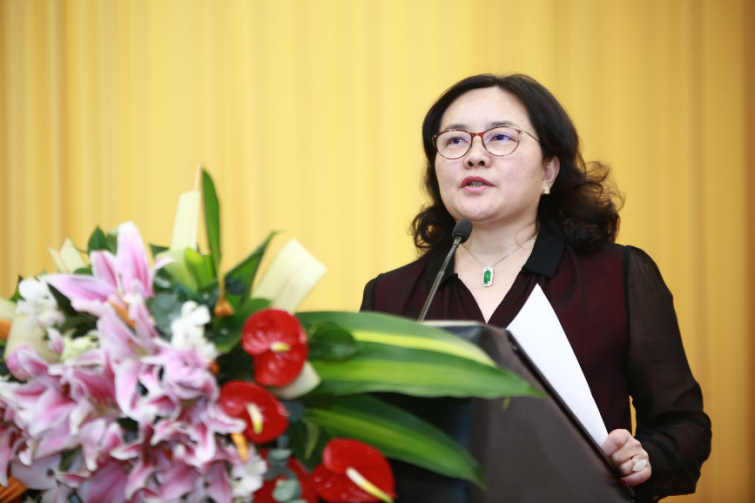
Picture shows Li Hua's speech
With the topic of "Tax Dynamics of Digital Economy and Corporate Tax Management", Director Li Hua explained the new ways and long-term solutions of taxing digital business activities through the background introduction of the global digital economy taxing environment. She pointed out that digitalization is the mainstream feature of economic development, and in the era of digital economy, the way of creating and transmitting value has changed dramatically, and the big data formed by consumers displaying their preferences through social platforms has become an important factor in the value creation chain.
After the keynote speeches, Hu Tianlong, Associate Professor of School of Finance and Economics, Renmin University of China, and Xu Yan, Associate Professor of Comparative Law Research Fellow, China University of Political Science and Law, made wonderful comments.
The forum held a short closing ceremony at 18:30. Liu Tianyong, Director of the Professional Committee of Finance and Taxation Law of the National Lawyers Association and Director of Hwuason Law Firm, acted as the moderator. Mr. Zhang Xiaoping, Deputy Secretary General of China Association of Registered Taxation Technicians, and Mr. Shi Zhengwen, Director of the Research Center of Finance and Taxation Law of China University of Political Science and Law, delivered speeches successively.

Figure for Zhang Xiaoping, Deputy Secretary General speech
On behalf of the organizers, Deputy Secretary General Zhang Xiaoping expressed his gratitude to all the participants in his speech. He congratulated the success of this forum, which lasted for one day. Although the time was short, all the guests of the forum discussed national governance around new dynamics and new business, and the theme of the forum and the topics of the various parts of the seminar, and put forward a lot of forward-looking and strategic views, and witnessed the selection and awarding of the ten best tax law cases. Selection and Awarding. He expressed his expectation that tax lawyers and tax accountants could root the concepts of tax system innovation and tax rule of law in the innovation of tax-related service activities.
Prof. Shi Zhengwen pointed out in his speech that this forum took stock of the most cutting-edge legislation, policies and changes, the hottest and newest business, and the latest controversial cases of tax-related services in our country in the past year, which made us more confident in the future development of our business, and also confident in the tax lawyers and tax accountants joining hands with each other, encouraging each other, and moving forward together to develop China's tax law service market better and more confidently. After the speeches of the guests, Director Liu Tianyong, on behalf of the organizing committee of this forum, announced the successful closing of this year's China Tax Law Forum.
Since 2010, the National Lawyers Association of China and the China Association of Registered Taxation Technicians have jointly organized eight sessions of China Tax Law Forum and China Tax Lawyers and Taxation Technicians Forum. With the theme of "Promoting the Modernization of National Governance System and Governance Capability and New Opportunities for Tax-related Services", the forum has focused on the major theoretical and practical issues such as "Promoting the Modernization of National Governance System and Governance Capability" and other important issues such as tax law, tax law, tax lawyers, tax lawyers and tax lawyers. The participants, including tax cadres, tax law scholars, tax lawyers, tax accountants, enterprise financial personnel, experts and scholars from universities, carried out extensive and in-depth discussions on "promoting the modernization of the national governance system and governance capacity" and other major theoretical and practical issues, highlighting the organic combination of cutting-edge, theoretical, practical, professional and openness, and the degree of social attention and participation reached an unprecedented level. The successful convening of this forum will play a more positive role in implementing the spirit of the Fourth Plenary Session of the 19th CPC Central Committee, deepening the reform of the fiscal and taxation system, implementing the principle of tax law, and continuing to lead the development of the tax-related service industry including tax lawyers and tax accountants, as well as business innovation and strategic cooperation. In the future, China Tax Law Forum will continue to explore the major frontier issues in the construction of the rule of law in taxation in China in the new era, and help the reform of the national fiscal and taxation system and the construction of the rule of law in taxation!





